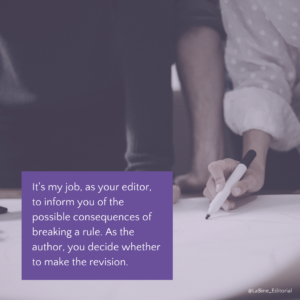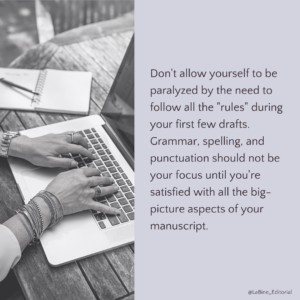Most fiction writers agree that grammar and punctuation rules exist for a reason. They understand that learning and applying these rules to their writing will increase the likelihood of readers enjoying the resulting novel.
I believe this is true, for the most part. There’s a certain amount of rule-following that you as a writer will want to do to avoid clunky, awkward sentences and paragraphs that confuse and repel your readers.
What’s unfortunate is that sometimes writers get so caught up on making sure they follow all the rules (pleasing the grammar police) that they feel paralyzed every time they sit down to write.
Take heart, writers. Remind yourselves of the following:
- Fiction writing allows for some bending of the rules. Occasionally trying something unorthodox is encouraged.
- Each writer has their own style and voice. (How boring novels would be if every author followed the same rules in the same way every time!)
- There are many different dialects of English in the US. (The number varies depending on what counts as a subdialect.) What’s considered correct in one dialect may sound completely wrong in another.
- A good copyeditor will let you know which grammar, spelling, and punctuation rules you may be breaking, and they will give you advice on whether breaking each rule is worth it—is it working for you or against you?
My thoughts on rule-following in fiction writing and editing
I believe each writing decision you make has a consequence, and that consequence can either be a desired one or an undesired one. My job as the editor is to inform you of the possible outcomes of your choices and to be a sounding board and a collaborator.
 My edits are always up for discussion. Sure, there are certain writing and grammar rules that are best followed 99.9% of the time, but I’m willing to offer explanations and suggest any alternative solutions. Most of the other rules can be broken from time to time when doing so will help enhance a part of your story.
My edits are always up for discussion. Sure, there are certain writing and grammar rules that are best followed 99.9% of the time, but I’m willing to offer explanations and suggest any alternative solutions. Most of the other rules can be broken from time to time when doing so will help enhance a part of your story.
Outdated grammar rules
Language evolves. Pick up any book written a hundred years ago, and it will be obvious to you that “good” writing from back then is different from “good” writing today. We can recognize a good book from a hundred years ago, but that doesn’t mean that the same book written today would be accepted as such.
Certain grammar rules and punctuation conventions have gone out of fashion over time. Some have been considered outdated for a while; others are more recent. And some “rules” were never rules at all, but nonetheless were taught and enforced by well-meaning English teachers.
I’m going to point out four of these rules and give examples of each being broken (successfully, in my opinion) in traditionally published books.
You may disagree with me and choose to continue following one or more of these rules. As the author of your story, you get to make that choice.
Okay, so what are these “rules” that many editing professionals believe can be let go?
"Rule" #1: Don't start a sentence with and, or, but, or because
If it makes sense and it sounds right to you when you read the paragraph out loud, go ahead and start a sentence with and, or, but, or because.
From Mr. Penumbra’s 24-Hour Bookstore by Robin Sloan:
San Francisco’s architectural style didn’t really make inroads anywhere else in the country, and even when you live here and you’re used to it, it lends the vistas a strangeness: all the tall narrow houses, the windows like eyes and teeth, the wedding-cake filigree. And looming behind it all, if you’re facing the right direction, you’ll see the rusty ghost of the Golden Gate Bridge.
From Homeland Elegies by Ayad Akhtar:
Why were we quoting Shakespeare and playing squash and eating cucumber sandwiches? And why didn’t we tear up the roads they’d built and pave our own? Or fill the canals they’d dug to transform dusty Punjab into the most fertile land on the subcontinent?
From The Sugar Queen by Sarah Addison Allen:
She’d made her decision. She lived with it. But staying away from him was easier when she didn’t actually have to be near him.
"Rule" #2: Don't end a sentence with a preposition
When it’s easy to avoid ending a sentence with a preposition, go ahead and follow this rule. Often, however, avoiding ending a sentence with a preposition sounds so ridiculous that it makes the sentence hard to understand.
From One Italian Summer by Rebecca Serle:
There is an edge to his voice, and I realize, not for the first time in the past few months, how unused to discomfort we both are. We do not know how to live a life that the bottom has fallen out of. These were not the promises of our families, our upbringings, our marriage.
This could be written as We do not know how to live a life of which the bottom has fallen out, but I don’t like it; do you?
From the same novel:
Positano is not an easy place to get to.
Would this sound better as To Positano is not an easy place to get? No. No, it would not.
"Rule" #3: Don't write sentence fragments
Sentence fragments do have a place in fiction writing. They must be used intentionally, but when they are, they can be an effective tool for adding emphasis to a sentence, changing the pace of a scene, and decreasing the formality of a piece of fiction.
From Mr. Penumbra’s 24-Hour Bookstore by Robin Sloan:
My eyes trace a line above my knuckles, searching the spines—and there, I spot it. The book I’m looking for.
Sloan committed two grammar “crimes” here! Besides the fact it ends in a preposition, this sentence is a fragment. There’s no verb for the subject, book. (I’m looking for is not a verb in this case—it describes the book.)
But do you see how Sloan’s sentence fragment lets the reader know that this is an important moment? Sloan could have shown this in another way, but this was how he chose to do it, and I think it was a great choice.
"Rule" #4: Don't use they or them as singular pronouns
From Voyage of the Dawn-Treader by C.S. Lewis:
She kept her head and kicked her shoes off, as everybody ought to do who falls into deep water in their clothes.
Should Lewis have written She kept her head and kicked her shoes off, as everybody ought to do who falls into deep water in his or her clothes? Or should he have ignored one of the genders (not to mention the entire spectrum of gender) and used only his?
I’m glad he chose the singular their.
Voyage of the Dawn-Treader was published in 1952, but many writers are still hesitant to use they and them as singular pronouns. This “rule” seems to be hanging on, but I’m hoping it falls away completely in the near future.
Here’s a more recent example from An Army of One by Lexa Luthor, a successful self-publishing author of sci-fi and fantasy romance:
There was nothing sexier than a powerful Alpha who trusted their mate and handed over everything.
Point-of-view rules are important to follow
Probably one of the first (and most important) things you did when starting your manuscript was to choose a point of view. Point of view affects how your readers experience your story, and following the rules for point of view is important if you don’t want to confuse your readers or break their trust in your role as the storyteller.
 POV issues can be frustrating and time-consuming to fix in later drafts. No matter what you do, there will be POV issues to fix. But following POV guidelines early on will make everything much easier in the long run.
POV issues can be frustrating and time-consuming to fix in later drafts. No matter what you do, there will be POV issues to fix. But following POV guidelines early on will make everything much easier in the long run.
I dig deeper into POV rules in this post. Joe Bunting’s fantastically helpful blog post “Point of View in 2022” is a good read as well. Learn the basics now to avoid confusion (for you, your editor(s), and your readers) later.
My concluding advice
Don’t worry too much about grammar, spelling, and punctuation during that first draft. Hell, don’t worry about them in the second and third drafts! Until you’re happy with the big-picture aspects of your story, grammar rules should not be a concern.
As the writer, your role is to be the creative, to create a piece of art, to entertain your reader. So unless your grammar, spelling, and punctuation are so horrible that your alpha or beta readers can’t understand your writing, don’t dwell on them. 
Once you’re satisfied with your story overall (and perhaps worked with a developmental editor), and once you’ve cut out all the unnecessary, then you can check your grammar and spelling. Learn what you can and do what you can. Then enlist the help of a copyeditor.
